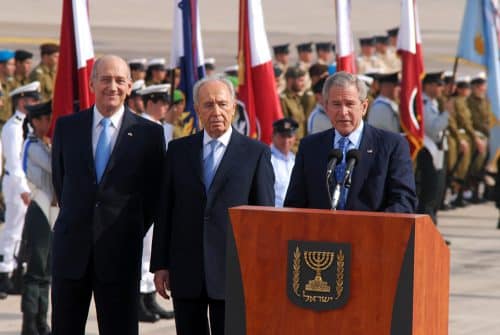The strike that took place last Saturday (February 17, 2023) in Syria, which was attributed to Israel in the foreign press, as well as by Syria and Iran, was allegedly intended to damage a weapons cache near the Damascus airport. During the strike, a building in the Kafr Sousa neighborhood of Damascus was damaged, apparently as a result of a faulty launching by Iran’s revolutionary forces of a Syrian anti-aircraft missile. According to reports, this building serves as the headquarters for Iranian and Syrian military intelligence officials. For decades, the Kafr Sousa neighborhood has been known for its heavy presence of Iranian nationals, and is the same location where Hezbollah military forces commander Imad Mughniyeh was killed in 2008. According to international media reports, this attack was carried out jointly by Israel and the US. The neighborhood is located near the president’s palace, as well as close to the Iranian Embassy in Damascus, and it is common knowledge that it is kept under heavy surveillance and protected by the best security forces in Damascus, and even in the entire country.
Assuredly, the goal of this alleged Israeli attack was to send two central messages to Iran, Syria and the international community. Firstly, Israel is signaling that nothing has changed regarding its policy vis-à-vis Syria as a result of the powerful earthquake that took place in northern Syria two weeks ago. Furthermore, Israel is signaling that it might even intensify its attacks on Syria precisely as a result of the humanitarian situation unfolding there. After the earthquake, Iran began transferring large volumes of humanitarian equipment on planes, and there have been reports in the media recently claiming that the Iranians were taking advantage of this situation to smuggle weapons and military equipment to Shia militias and Iranian forces in Syria on these aircraft. On this topic, a military official recently warned in an interview with the Saudi Elaph newspaper that Israel will not hesitate to attack every shipment of Iranian weapons that reaches Iran under the guise of humanitarian aid. The official went on to say that, “We have information about Iran’s intentions to take advantage of the tragic situation in Syria to transport weapons and military equipment to Hezbollah under the guise of humanitarian aid. Under no circumstance will Israel stand by and allow this to happen. We are prepared to attack every location within Syria’s borders.”
In the same interview, the official went on to say that Israel has expanded its surveillance of every transport that enters Syria from Iran at the current time, especially in light of the fact that in the past Iran has hidden weapons in trucks carrying fruit and vegetables, and other humanitarian aid, and that Israel attacked these transports the moment they crossed over the border from Iraq into Syria. Israel is tracking every occasion in which Iran attempts to take advantage of the humanitarian crisis in Syria to smuggle weapons. In essence, the recent attack was Israel’s declaration stating that it will not sit back and watch while Iran takes advantage of the humanitarian crisis unfolding in Syria due to the natural disaster, in an effort to further its goals.
Secondly, it is possible that the recent attack on Syria could be in retaliation for the Iranian attack on an Israeli-owned ship in the Persian Gulf two weeks ago (February 10, 2023). This attack was carried out on an oil tanker in the Persian Gulf, apparently using Iranian-made Shahed-136 suicide drones, which are the same drones that Iran transferred to Syria to be used by Russia in the war in Ukraine. It appears that the Iranian attack on the Israeli-owned oil tanker was a continuation of the Iranian attempt to increase its level of deterrence against Israel: Each time Israel carries out an attack against Iran, Teheran feigns carrying out a counterattack in response. In this case, we can assume that the Iranian attack in the Persian Gulf was retaliation for the alleged Israeli attack on the armament factory in Isfahan, Iran this past January. At the same time, this past Monday (February 20, 2023), Israel revealed that the IDF arrested two Syrian terrorists – operatives of Hezbollah’s Golan Unit – who had been tasked with gathering intelligence on Israel to be utilized in future attacks.
Despite this war of attrition, Iran is alive and kicking in Syria
Notwithstanding ongoing IDF activity against Iranian and Syrian targets in Syria, as part of a war of attrition, Iran still maintains bases in Syria from which it continuously launches military operations, and has constructed strongholds in Damascus and Dir A-Zur, located in eastern Syria near the Iraqi border. Iran is also incessantly making efforts to fortify its military presence in Syria, has built an additional Iranian base on the frontline near the Israeli border, and is endlessly transferring advanced weapons to Hezbollah in Lebanon.
In parallel, Iran has been using its Shia militias to carry out ongoing operations against American targets, focusing mainly on the American military base in A-Tanef and the American Conoco Natural Gas Station. One such incident took place last week (February 15, 2023), in which the US Army shot down an Iranian spy drone in northeastern Syria that was carrying out espionage activity in the sky over one of its bases in Syria. Over the last eighteen months, the US has made a concerted effort to refrain from retaliating militarily against Iran, except for one irregular incident that took place in August 2022, in which the US attacked a facility belonging to Iran’s Revolutionary Forces in eastern Syria, after Iranian drones attacked American targets the previous week. The US Administration in Washington has been taking a pacifist and restrained approach towards Iran, since the Biden Administration was, and remains, interested in returning to the negotiating table regarding the nuclear issue, even if Iran continues to do everything to make this less likely, such as by attacking US targets inside Syria, sending weapons to aid Russia in the war with Ukraine, violently repressing widespread protests against the Iranian regime, including the incident in which Kurdish protestor Mahsa Amini was murdered, in addition to the difficult economic situation and ongoing repression by the regime on the Iranian people. Thus, despite statements made by President Biden, that the “agreement is dead” and that the chances of reaching an agreement are slim, and despite the fact that European countries are distancing themselves from a nuclear agreement due to Iran’s domestic and foreign policies, it appears the Biden Administration is still determined to reach an agreement, which in its view would be considered a significant political achievement.
Conclusions and Recommended Plan of Action
For each time that Iran attempts to harm Israel, the latter must retaliate forcefully, and resolutely continue working to prevent Iran and its militias from establishing bases in Syria and turning them into a front from which Iran could defend itself during this period of ongoing skirmishes.
Israel must take advantage of the existing tensions between Iran and the West, and especially with the US, in order to intensify both economic and military pressure on Iran – with extra attention on its forces in Syria. In this context, Israel can offer the US more significant aid to Ukraine, which the US has been requesting from Israel throughout the past year, in exchange for the US’s agreement to take more severe measures against Iranian forces in Syria, including joint cyber and kinetic military operations. Nevertheless, at the same time, Israel must make sure that this additional aid to Ukraine does not lead to an outright clash with Russia, since the latter is the de facto power controlling the areas in Syria that are under President Assad’s control.
Meanwhile, action must also be taken against Iran’s military nuclear program. Now is the time for Israel to put heavy pressure on European countries and the US, as well as carry out a public diplomacy campaign and closed discussions with state officials to impose stringent economic sanctions on Iran, since it refuses to cease the development of its nuclear weapons program and refuses to sign a new nuclear agreement. In this context, Israel must demand that the UN Security Council reimpose a snapback provision that would reactivate the sanctions that were lifted after the nuclear agreement was signed in 2015.
Furthermore, and most importantly, Israel must convince the US to strengthen its military position vis-à-vis Iran, which in the eyes of the White House is still on the table, and to endorse this position in public statements voiced by American officials. As in the past, the only way to ensure that the agreement Iran signs will be beneficial and fulfill the necessary security requirements is by making it clear that failing to do so will lead to stringent and extensive economic sanctions, as well as strong and unfailing military action.
Dr. Omer Dostri is a Researcher at The Jerusalem Institute for Strategy and Security, and at IDSF-Habithonistim.
The views expressed in this article are those of the author and do not necessarily represent the views of the movement.





